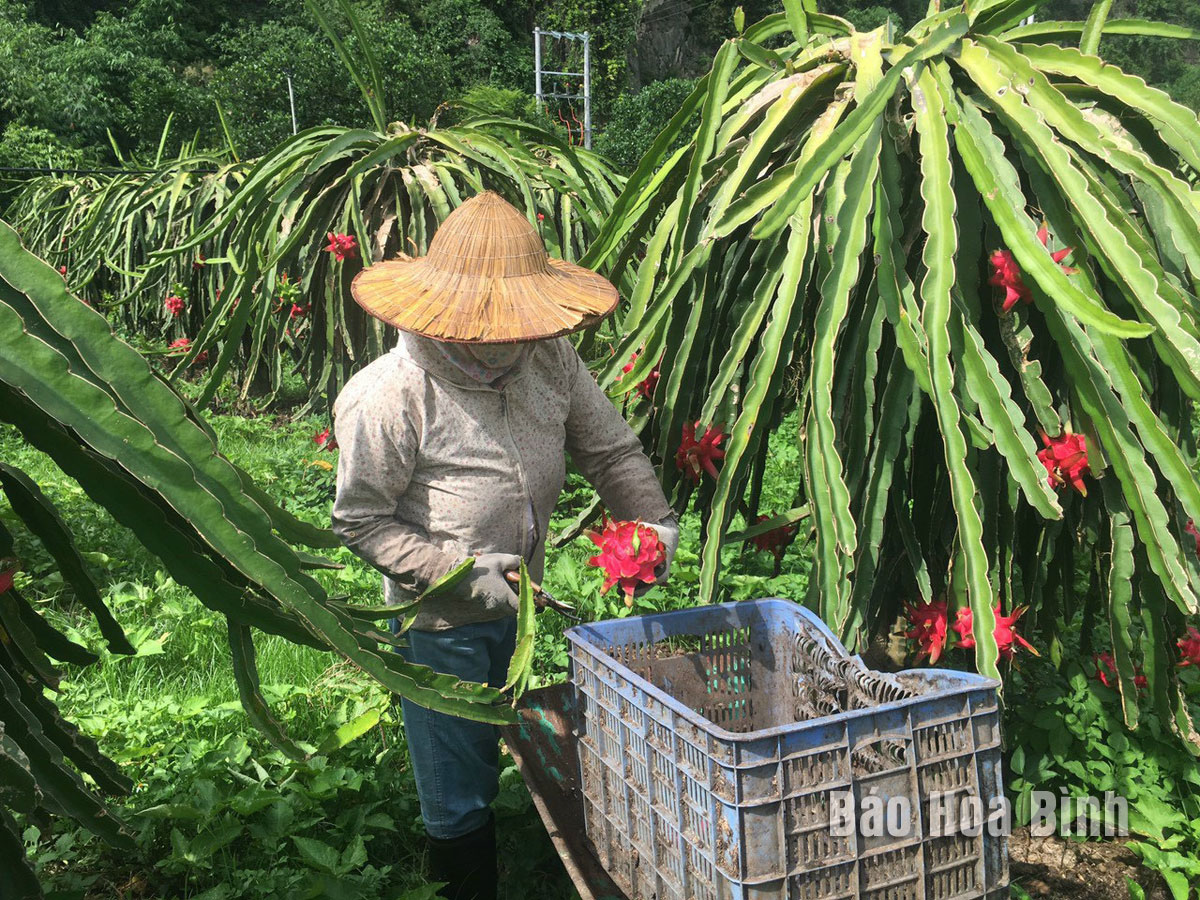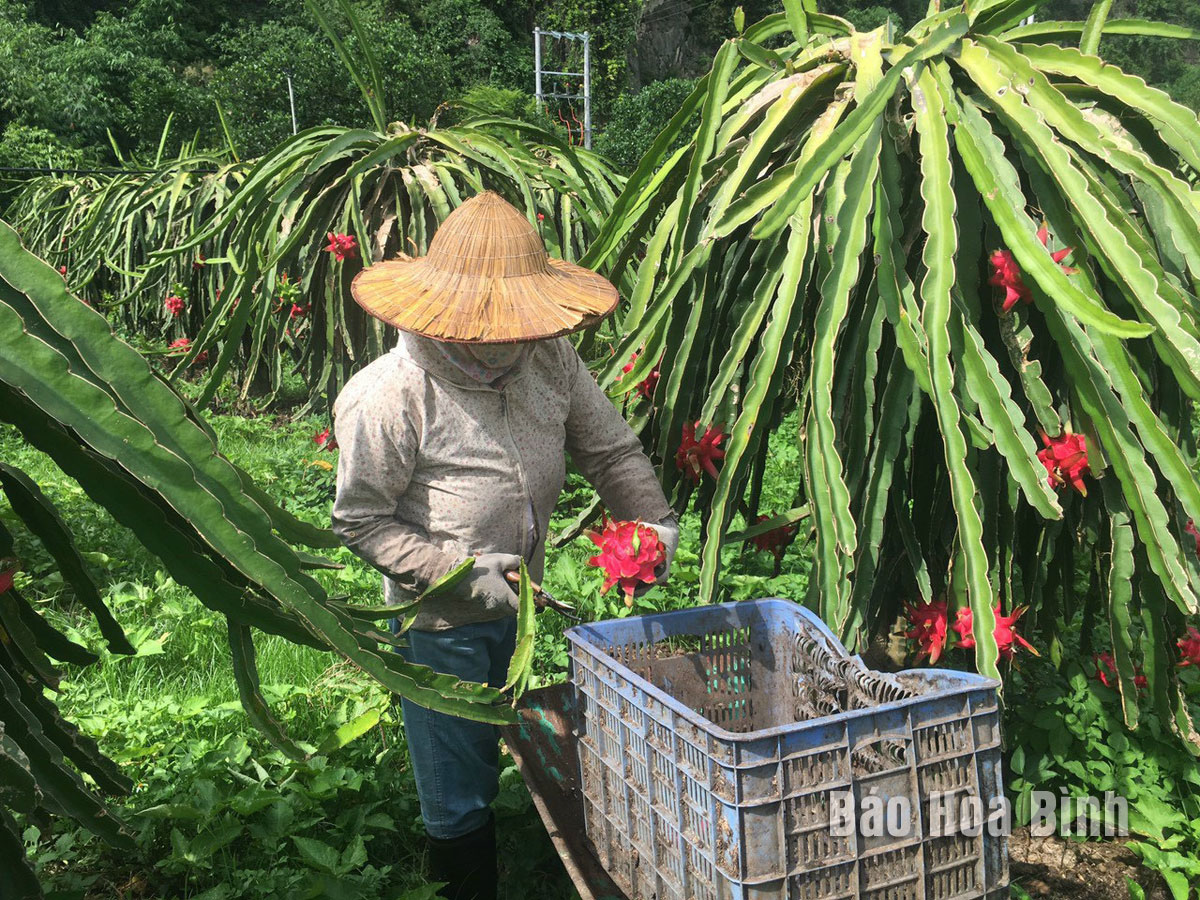
Over the past years, Hoa Binh has issued many documents regarding food safety in the agro-forestry-fisheries sector, and agricultural restructuring.
Farmers in Ba Hang Doi town in Lac Thuy district grow dragon fruit following VietGAP standards.
Binh Son Agricultural and Trade Service Cooperative in Kham hamlet, Binh Son commune, Kim Boi district, has successfully put in place a safe vegetable production model.
With 13 hectares of zucchini, pumpkin, and cucumber, the cooperative has seriously complied with VietGAP standards, using organic fertilizers and microbial pesticides, which have helped raise its profits by 20-30% as compared with traditional farming methods.
The cooperative has also partnered with Sakata Company in sales and another in seed supply, according to its Director Nguyen Thi Thu Hoai.
Many other cooperatives, businesses, and households in the province have also followed the model as VietGAP products are widely favored by consumers, and have stable prices.
In the first half of this year, the provincial sub-department of quality management of agro-forestry-aquatic products granted VietGAP and GlobalGAP certificates to 142 facilities, and supported 20 others to join the pork production and consumption chain in Hoa Binh city.
The province has also paid attention to brand building and trade promotion. During the six-month period, 147 businesses and cooperatives were assisted to participate in such programmes both at home and abroad.
Meanwhile, local products under the "One Commune – One Product” (OCOP) program have been put up for sale at the traceability portal https://hb.check.net.vn.
Le Minh Thuy, head of the sub-department, said the good agricultural production models have contributed to boosting food processing and local socio-economic development, especially in ethnic minority-inhabited areas.
The province will roll out more projects, plans, programs, mechanisms, and policies to support organizations and individuals investing in agriculture, and rural areas, upgrade infrastructure, build and expand production and consumption chains, and continue with promotion activities, the official said./.
According to data from the Hoa Binh Provincial Party Committee, the industrial production index for the first six months of 2025 is estimated to have increased by 20% compared to the same period last year. This marks the highest year-on-year growth rate for this period since 2020.
In the first six months of 2025, Hoa Binh province’s export turnover was estimated at 1.145 billion USD, marking an 18.11% increase compared to the same period in 2024. Import turnover was estimated at $ 804 million, a 17.15% increase, which helped the province maintain a positive trade balance.
The lives of the ethnic minority farmers in Tan Lac district have gradually improved thanks to the new directions in agricultural production. This is a testament to the collective strength fostered through the professional associations and groups implemented by various levels of the district’s Farmers’ Union.
With the motto the "product quality comes first,” after nearly one year of establishment and operation, Muong village’s Clean Food Agricultural and Commercial Cooperative, located in Cau Hamlet, Hung Son Commune (Kim Boi district), has launched reputable, high-quality agricultural products to the market that are well-received by consumers. The products such as Muong village’s pork sausage, salt-cured chicken, and salt-cured pork hocks have gradually carved out a place in the market and they are on the path to obtaining the OCOP certification.
In the past, the phrase "bumper harvest, rock-bottom prices" was a familiar refrain for Vietnamese farmers engaged in fragmented, small-scale agriculture. But today, a new spirit is emerging across rural areas of Hoa Binh province - one of collaboration, organisation, and collective economic models that provide a stable foundation for production.
Maintaining growing area codes and packing facility codes in accordance with regulations is a mandatory requirement for agricultural products to be eligible for export. Recently, the Department of Agriculture and Environment of Hoa Binh province has intensified technical supervision of designated farming areas and packing facilities to safeguard the "green passport" that enables its products to access international markets.



